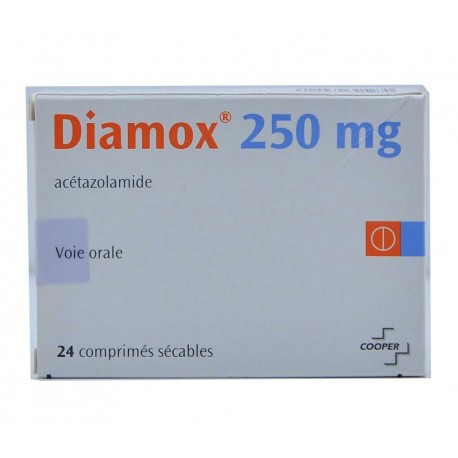 View larger
View larger Volume discounts
| Quantity | Discount | You Save |
|---|---|---|
| 2 | 5% | Up to $2.70 |
| 3 | 10% | Up to $8.10 |
| 4 | 15% | Up to $16.20 |
| 5 | 20% | Up to $27.00 |
More info
DIAZOMID 250 mg tablet Taken orally.
•
Active ingredient
Acetazolamide 250 mg
•
Excipients
Lactose, corn starch, PVP K-30, tartrazine, magnesium stearate
Read this USE INSTRUCTIONS carefully before you start using this medicine because it contains important information for you.
Keep these instructions for use. You can need to read again.
• If you have other questions, please talk your doctor or pharmacist.
• This medicine has been prescribed for you personally, do not pass it on to anyone else.
• During the use of this medicine, when you go to a doctor or hospital, tell your doctor that you are using this medicine.
• Follow exactly what is written in this instruction. Do not use high or low doses other than the recommended dose for the drug.
In this Instructions for Use:
1. What is DIAZOMID and what is it used for?
2. Things to watch out for before using DIAZOMID
3. How to use DIAZOMID?
4. What are the possible side effects?
5. Hiding DIAZOMID
Headings are included.
What is DIIAZOMID and what is it used for?
DIAZOMID contains acetazolamide active ingredient. There is 250 mg of active substance in 1 tablet. It is available in blister packs containing 10 tablets.
Your doctor may have prescribed DIAZOMID for one or more of the following reasons:
Treatment of open angle or secondary glaucoma (disease associated with increased intraocular pressure)
Preoperative treatment of acute congestive glaucoma (disease that causes an increase in intraocular pressure)
Congestive heart failure (respiratory failure due to heart failure, edema, liver enlargement and prominent disease) treatment and in the treatment of secondary edema caused by drugs, in combination with other drugs,
As an adjunct with other drugs in the treatment of epilepsy (epilepsy)
In the prevention and improvement of symptoms in acute altitude sickness
2. Things to watch out for before using DIIAZOMID
DO NOT USE DIAZOMID in the following situations
• If you are allergic to acetazolamide, which is the active substance contained in the drug, or one of the excipients (Acetazolamide is a sulfonamide derivative. Cross-sensitivity reaction may occur)
If the level of sodium and / or potassium in your blood is low
You have a significant disease or dysfunction in your kidneys or liver
If your adrenal gland has a deficiency
• If you have a serious condition with an increase in blood chlorine that causes acid-base balance to deteriorate in your body (hyperchloremic acidosis)
If you have a serious liver disease called cirrhosis.
Persistent and non-congestive closed-angle glaucoma (related to increased intraocular pressure)
disease) (prolonged use of acetazolamide may mask the worsening of glaucoma by lowering intraocular pressure.)
USE DIAZOMID CAREFULLY in the following situations
• If you have diabetes (It may cause a decrease or increase in blood sugar)
• If you are elderly and have impaired kidney function (a serious metabolic disorder called acidosis may develop).
• If you are on long-term treatment (Your doctor may want to periodically measure blood electrolytes and check your blood count, and if you notice any unusual skin rash; he may prompt you to report it immediately).
• If the dose of the drug is increased (the incidence of dizziness and subjective sensory impairment may increase).
• If you have a disease in your lungs that obstructs the air sacs (eg emphysema) or a disorder that reduces the aeration of the air sacs in the lungs (acidosis may worsen.)
• High altitude sickness can occur while doing a fast mountain climbing. We will stop climbing immediately.
• If you use high doses of aspirin simultaneously (loss of appetite, too fast breathing, lethargy and dizziness, metabolic acidosis, coma and death cases have been reported.)
If these warnings apply to you, even at any time in the past, please visit your doctor.
Using DIAZOMID with food and drink
Swallow your medicine with enough liquid (1 glass of water) as recommended by your doctor. It can be taken with food to prevent gastrointestinal diseases.
Pregnancy
Consult your doctor or pharmacist before using this medication.
DIAZOMID will be prescribed by your doctor during your pregnancy only if the potential benefit outweighs the risks.
If you notice that you are pregnant during your treatment, consult your doctor or pharmacist immediately.
Breast-feeding
Consult your doctor or pharmacist before using this medication.
Breast-feeding
Vehicle and machine use
Vehicle and machine use
Important information about some of the excipients contained in DIAZOMID
This medicinal product contains lactose. If you have been told by your doctor that you have an intolerance (sensitivity) to some sugars

